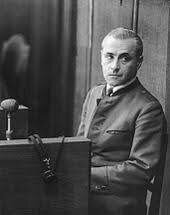The organization was created to solve a problem that didn’t exist. It was set up without obtaining buy-in from any of the organizations affected by its existence. It was run by sycophants who enabled an increasingly unstable boss to destroy everything.
This bureaucratic boondoggle was the Oberkommando der Wehrmacht (OKW) and the chronicler of its dysfunction was General Walter Warlimont, Deputy Chief of Operations. Warlimont reported to General Alfred Jodl, who reported to General Wilhelm Keitel, who reported to the boss, Adolf Hitler.
Hitler preferred chaos because it distracted people from challenging him. Nazi Germany was full of organizations with overlapping responsibilities run by people who constantly jockeyed for his favor. Anyone who developed an independent power base was undermined, attacked and replaced.
The OKW was a product of this divide and conquer system, adding a bureaucratic layer over existing organizations. Hitler created the OKW in 1933 to weaken the German Army which was independent of the Nazis. He appointed General, later Field Marshal, Werner von Blomberg to lead OKW. Blomberg was a smooth operator with years of experience interacting with politicians.
But underneath his cultivated manners lurked the heart of an ambitious man who wanted to expand the powers of the OKW. Imagine the Chair of the Joint Chiefs of Staff suddenly trying to take over the responsibilities of the Army, Navy, Air Force and Marines, leaving their most senior officers as glorified errand boys. In 1933, the German officer corps was no more amused by Blomberg’s power grab than their modern equivalents would be.
The resistance to Blomberg’s power grab was led by the German Army. Since OKW was largely staffed by Army officers, the bitter fighting ruined lifelong friendships. After the war, survivors, including Warlimont, used their memoirs to pay off old scores. The character assassinations are alternately amusing and repelling as with all political memoirs.
However, the Army Commander-in-Chief, General Werner von Fritsch became more worried about Hitler’s war plans than Blomberg’s power grab. Fritsch joined Blomberg to argue that Germany lacked the trained soldiers, guns, ammunition, artillery, panzers and air support to go to war any time before 1942. That’s not what Hitler wanted to hear.
By early 1938, Hitler was fed up with Blomberg and Fritsch trying to slow his march to war. He asked his dirty tricks man, Reinhard Heydrich, to dig up dirt on both men. Heydrich found proof that Blomberg’s new bride had been convicted of prostitution. This was a bombshell since Herman Goring had been best man and Hitler was a witness at the wedding.
Hitler claimed to be outraged at being involved in a salacious scandal. His mistress, Eva Braun, was safely hidden at the Berghof, far away in Bavaria. Hitler ordered Blomberg to have the marriage annulled. Blomberg refused. Goring then threatened to publish the bride’s entire police record. Blomberg crumbled and resigned, pushed into retirement. He was arrested by the Allies in 1945 and was a witness at the Nuremberg war crimes trials before dying of cancer in 1946.
Next, Heydrich dusted off an old file from 1936 in which Fritsch was accused of having a homosexual affair. The entire case was bogus, based on false testimony by a known criminal but Hitler didn’t care. He knew people would believe the lies they heard first rather than the truth revealed later. The case quickly fell apart but Fritsch’s reputation was ruined. Fritsch died in 1939 after being wounded during the invasion of Poland.
With Blomberg and Fritsch pushed out, Hitler appointed himself Supreme Commander. He promoted Blomberg’s deputy, Wilhelm Keitel, to Chief of OKW because Keitel did as he was told. Keitel’s nickname was Lakeitel, a play on “lakai” or lackey. Keitel and his subordinate General Jodl were sycophantic weaklings.
Hitler had no respect for his new OKW flunkies and often bypassed them to talk directly to lower command levels. By jumping over multiple layers of the chain of command, Hitler simultaneously undermined the entire officer corps and sowed confusion with conflicting orders. While Germany was winning, no one cared; but inevitably the chaos amplified the downward spiral to defeat. Hitler blamed everyone but himself before committing suicide. Keitel and Jodl were convicted of war crimes and hanged at Nuremberg in 1946.
General Walter Warlimont was injured in the July 20, 1944 bomb attack that failed to kill Hitler and retired from active duty. He was convicted of war crimes but released in 1954. In 1962, he released his memoirs, Inside Hitler’s Headquarters 1939 – 45 (English language edition, 1964). Warlimont was interviewed for the 1970’s BBC series “World at War”. He died in 1976.
Want to receive this blog straight to your inbox? Sign up for my mailing list.
You can also follow me at HerSavvy.com. My column appears the 3rd Tuesday of each month.
=========




